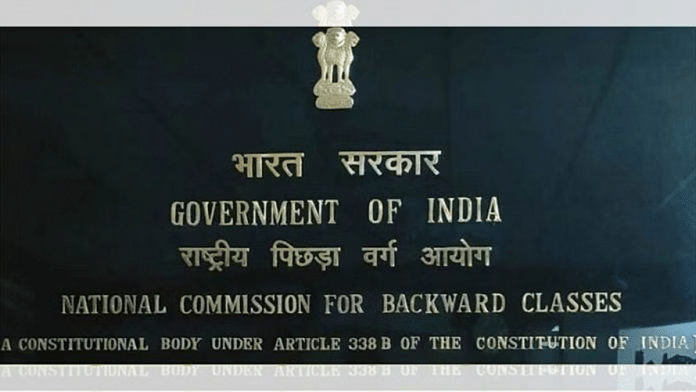New Delhi: Questioning Karnataka’s policy categorising all Muslims as a backward class, National Commission for Backward Classes (NCBC) chairperson Hansraj Ahir said the state chief secretary would be summoned for not submitting the report based on which Muslims were included in the Other Backward Classes (OBC) category on the grounds of religion.
Ahir said that the Congress-led Karnataka government’s OBC reservation policy is depriving people from other backward classes of their rights. This comes days before the first round of polling in the state for the Lok Sabha on 26 April.
The Karnataka government provides 32 percent reservation to OBCs under five categories — Category I, Category II-A, Category II-B, Category III-A and Category III-B.
The NCBC said that according to the state’s policy, all Muslims of Karnataka are treated as socially and educationally backward under Category II-B. In addition, they also get OBC quota benefits under two other categories — 17 Muslim communities listed in Category-I and 19 Muslim communities in Category II-A.
The reservation under Category II-B had become a political issue ahead of the assembly elections in the state last year. In March 2023, the then BJP government had scrapped 4 percent OBC quota for Muslims (under Category II-B) and distributed 2 per cent each to two dominant communities — Vokkaligas and Lingayats. But the state government’s notification was challenged in the Supreme Court, which stayed its implementation.
The OBC quota to Muslims under Category II-B continued after the Congress came to power. In July 2023, the NCBC had red-flagged the issue during a field visit to the state to examine the reservation policy. It sought detailed explanation, along with the report based on which four percent reservation for Muslims was introduced under Category II-B.
The Commission criticised the categorisation of the entire Muslim community in the state as a backward caste. “There is a 4 percent quota for Muslims under Category II-B, then why are they given OBC quota under two other categories? With reference to the reply submitted by the Karnataka government, it is obvious that the rights of actual Other Backward Classes are being taken away,” Ahir said Wednesday.
According to the 2011 Census, Muslims constitute 12.92 percent of the population in Karnataka.
“Despite repeated reminders, we have not received the report or any detailed explanation for providing such reservation to the Muslims alone. In its last reply in February, the state’s Backward Classes Welfare Department said that communities like Muslims and Christians are classified on the basis of neither caste nor religion, but as backward classes. We will summon the Karnataka chief secretary in this regard,” Ahir told ThePrint.
ThePrint reached out to Karnataka Backward Classes Welfare minister Shivaraj Tangadagi and Department secretary G. Sathyavathi for a comment. Their response is awaited.
Ahir said that due to the state’s policy, Muslims are getting more than the four percent OBC quota and that the genuine OBC communities are being deprived of their rights.
Citing the data pertaining to OBC quota admissions in post-graduate courses in state’s medical colleges, he said that Muslims get close to 16 percent reservation there.
Referring to the February report by the Karnataka government, Ahir said, “Of the 930 PG seats in medical colleges, 150 seats were given to students from Muslim communities, which comes to nearly 16 percent. Under Category II-B, 102 people from Muslim community were given admission in 2022-23. In addition to this, 25 people also availed the benefit under Category I and 23 in Category II-A.”
“We just want the state government to show us the report based on which the policy was devised,” the NCBC chairman said.
(Edited by Mannat Chugh)
Also Read: Owaisi effect notwithstanding, why Kishanganj’s Muslims back Congress despite unpopular incumbent



